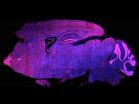(Press-News.org) Cancer researchers are constantly in search of more-effective and less-toxic approaches to stopping the disease, and have recently launched clinical trials testing a new class of drugs called BET inhibitors. These therapies act on a group of proteins that help regulate the expression of many genes, some of which play a role in cancer.
New findings from The Rockefeller University suggest that the original version of BET inhibitors causes molecular changes in mouse neurons, and can lead to memory loss in mice that receive it. Published in Nature Neuroscience on August 24, the study was led by C. David Allis, Joy and Jack Fishman Professor in the Laboratory of Chromatin Biology and Epigenetics, in collaboration with Robert B. Darnell, Robert and Harriet Heilbrunn Professor and head of the Laboratory of Molecular Neuro-Oncology.
The findings will likely fuel more research into the brain effects of BET inhibitors, and could lead to the development of safer drugs that reduce the risk of potential side effects such as memory loss.
First author Erica Korb, a postdoctoral fellow in Allis's lab, says the compound they tested in the study has the ability to cross into the brain from the bloodstream. However, this may not be the case for other drug variants tested in patients. Several companies are testing the inhibitors using unique formulations that they've optimized in proprietary ways--for example, by adding chemical groups to make a compound more targeted or effective--which might make it more difficult for the drug to cross the blood-brain barrier.
Many patients with hard-to-treat cancers have already received these experimental drugs. The Rockefeller scientists say their findings suggests more research is needed to determine whether the therapies can enter the brain, since that could potentially cause some unwanted side effects. "We found that if a drug blocks a BET protein throughout the body, and that drug can get into the brain, you could very well produce neurological side effects," says Korb.
Allis, Korb and their colleagues decided to test BET inhibitors in the brain. BET proteins help regulate the process of transcribing genes into proteins, a key step in cell division. Since neurons divide less frequently than other cell types, scientists hadn't given much consideration to the role of BET proteins in the brain, says Korb.
During the study, the researchers used a compound that was designed to thwart the activity of a specific BET protein, called Brd4. They used the original version of the drug, called Jq1, says Korb, which they knew could cross the blood-brain barrier.
The researchers added the drug to mouse neurons grown in the laboratory, then stimulated the cells in a way that mimicked the process of memory formation. Normally, when neurons receive this type of signal, they begin transcribing genes into proteins, resulting in the formation of new memories--a process that is partly regulated by Brd4. "To turn a recent experience into a long-term memory, you need to have gene transcription in response to these extracellular signals," says Korb.
Indeed, when the researchers stimulated mouse neurons with signals that mimicked those they would normally receive in the brain, they saw massive changes in gene transcription. But when they performed this experiment after adding Jq1, they saw much less activity. "After administering a Brd4 inhibitor, we no longer saw those changes in transcription after stimuli," says Korb.
To test how the drug affected mice's memories, researchers placed the animals in a box with two objects they've never seen before, such as pieces of lego or tiny figurines. Mice typically explore anything unfamiliar, climbing and sniffing around it. After a few minutes, the researchers took the mice out of the box. One day later, they put them back in, this time with one of the objects from the day before and another, unfamiliar one.
Mice that received the placebo drug were much more interested in the new object, presumably because the one from the day before was familiar. But mice treated with Jq1 were equally interested in both objects, suggesting they didn't remember the previous day's experience.
Next, the researchers took their findings one step further. If Jq1 reduces molecular activity in the brain, they asked, could it help in conditions marked by too much brain activity, such as epilepsy?
Brd4 regulates a receptor protein present at the synapse, a structure where two neurons connect and transmit signals. When the researchers administered the Brd4 inhibitor, they saw decreased levels of that receptor, and neurons fired much less frequently. Next, they gave the drug to mice for a week, then added a chemical that induces seizures.
The experiment showed that mice that received Jq1 had a much lower rate of seizures than those given a placebo drug. "In the case of the epileptic brain, when there's too much activity and neurons talking to each other, this drug could be potentially be beneficial," says Korb. "Extending the use of these drugs into non-cancer diseases, including neurological disorders, is a largely unexplored area with much potential." Allis adds.
INFORMATION:
Resveratrol, a compound found commonly in grape skins and red wine, has been shown to have several potentially beneficial effects on health, including cardiovascular health, stroke prevention and cancer treatments. However, scientists do not yet fully understand how the chemical works and whether or not it can be used for treatment of diseases in humans and animals.
Now, researchers at the University of Missouri have found that resveratrol does affect the immune systems of dogs in different ways when introduced to dogs' blood. Sandra Axiak-Bechtel, an assistant professor ...
In a new effort, researchers from the University of Pennsylvania and Baylor College of Medicine have used advanced imaging technology to fill in details about the underlying cause of canine diabetes, which until now has been little understood. For the first time, they've precisely quantified the dramatic loss of insulin-producing beta cells in dogs with the disease and compared it to the loss observed in people with type I diabetes.
"The architecture of the canine pancreas has never been studied in the detail that we have done in this paper," said Rebecka Hess, professor ...
Black bears in Yosemite National Park that don't seek out human foods subsist primarily on plants and nuts, according to a study conducted by biologists at UC San Diego who also found that ants and other sources of animal protein, such as mule deer, make up only a small fraction of the bears' annual diet.
Their study, published in this week's early online edition of the journal Methods in Ecology and Evolution, might surprise bear ecologists and conservationists who had long assumed that black bears in the Sierra Nevada rely on lots of protein from ants and other insects ...
For pregnant women who are at low risk of complications giving birth, the risk of newborn death and maternal complications is similar for obstetric deliveries by family physicians and obstetricians, according to a large study published in CMAJ (Canadian Medical Association Journal).
"It is common to assume that more specialized or higher-volume medical care will result in improved outcomes," writes Dr. Kris Aubrey-Bassler with the Primary Healthcare Research Unit, Discipline of Family Medicine, Memorial University of Newfoundland, St. John's, Newfoundland. "The obstetric ...
A new Canadian guideline aims to ensure that pain during vaccination is minimized in both children and adults. The guideline, published in CMAJ (Canadian Medical Association Journal), is targeted at all health care providers who administer vaccines.
"Pain from vaccinations is common and can make people hesitate about getting future vaccines even as adults," states Dr. Anna Taddio, Senior Associate Scientist at The Hospital for Sick Children (SickKids), Toronto, Ontario, and Leslie Dan Faculty of Pharmacy, University of Toronto. "This can put people at risk of contracting ...
Today's workforce is highly sex-segregated -- for example, most elementary school teachers are women, while most chemistry professors are men. Indiana University Bloomington researchers Bianca Manago, a doctoral student in sociology, and Cate Taylor, an assistant professor of sociology and gender studies, examine one important consequence of this occupational sex segregation: the stress exposure of women working in highly male-dominated occupations.
"We find that such women are more likely to experience exposure to high levels of interpersonal, workplace stressors," Manago ...
Indiana's strict voter identification law may have prevented some elderly citizens from voting in the last two presidential elections, but there's little evidence it kept large numbers of voters from the polls, according to research by Indiana University Bloomington doctoral student Adam Nicholson.
Nicholson compared turnout figures in the 2000, 2004, 2008 and 2012 elections in Indiana and in Nebraska and Pennsylvania, two states without voter ID laws. Unlike most previous research on voter identification laws, the study examined data at the county level, not the state ...
Atlanta, GA - August 24, 2015 - Individuals who received the flu vaccine were protected for up to 6 months post-vaccination, the duration of most flu seasons, according to a study presented at the 2015 International Conference on Emerging Infectious Diseases.
Each flu season, researchers work to find out how effective the flu vaccine was in order to measure its value as a health intervention. Factors such as age and health of an individual, as well the level of similarity between the flu virus and the flu vaccine can play a role in how well an influenza vaccine works.
"Few ...
New research into the impact of climate change has found that warming oceans will cause profound changes in the global distribution of marine biodiversity.
In a study published in the journal Nature Climate Change an international research team modelled the impacts of a changing climate on the distribution of almost 13 thousand marine species, more than twelve times as many species as previously studied.
The study found that a rapidly warming climate would cause many species to expand into new regions, which would impact on native species, while others with restricted ...
The second ice age during the Cryogenian period was not followed by the sudden and chaotic melting-back of the ice as previously thought, but ended with regular advances and retreats of the ice, according to research published by scientists from the University of Birmingham in the journal Nature Geoscience today (24 August 2015).
The researchers also found that the constant advance and retreat of ice during this period was caused by the Earth wobbling on its axis.
These ice ages are explained by a theory of Snowball Earth, which says that they represent the most ...


